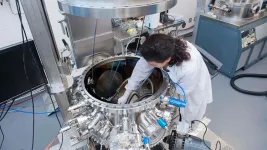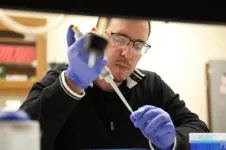Superconducting radiofrequency (SRF) technology, a core competency of Jefferson Lab, is used to accelerate the fundamental electron particles in the lab’s Continuous Electron Beam Accelerator Facility, enabling researchers from around the world to conduct cutting-edge experiments to study the fundamental building blocks of matter. With the investment from DOE’s Office of Nuclear Physics, Jefferson Lab scientists and engineers have been constantly improving the SRF technology to benefit particle accelerators for nuclear physics and other programs in the DOE’s Office of Science. That includes innovative superconducting materials and structures.
Now, leveraging its nearly four decades of expertise and capabilities in SRF science and technology, the lab is leading a multidisciplinary team to explore concepts to use these new superconducting materials and structures in ultra-energy-efficient Superconducting Digital (SCD) electronics aimed at emerging artificial intelligence and quantum computing technologies.
The team includes imec and the New York Center for Research, Economic Advancement, Technology, Engineering, and Science (NY CREATES) — both leading hubs for high-technology research and innovation — and Cornell University. Its strength lies in bringing together concept and design (imec), fundamental material development (Jefferson Lab), characterization (Cornell), and process development and implementation (imec and NY CREATES).
Their project, “Advanced superconducting integration process enabling sustainable hardware for AI and quantum computing,” is one of 11 multidisciplinary peer-reviewed projects selected by DOE to receive a total of $73 million in investments to accelerate new technologies from discovery to commercialization. The project is being funded through the Accelerate initiative through DOE’s Offices of Advanced Scientific Computing Research and Nuclear Physics.
During the DOE review process, the collaboration was qualified as “an A+ Team … of exceptional talent.”
“Society needs faster, better-performing computer technology,” said Anne-Marie Valente-Feliciano, Jefferson Lab senior physicist and SRF process and materials group leader. “The project is aimed at developing a new computer chip technology using superconducting materials for faster performance and improved efficiency.”
From imec, Anna Herr and Quentin Herr are renowned world experts who have pioneered several new technologies for computer memory. Both are former Northrop Grumman Fellows and now scientific directors at their company. Both imec and NY CREATES are able to turn innovation into processes and device structures that will lead to faster circuits.
“Without greater innovation in high-performance computing,” said Quentin Herr, “it’s predicted that by 2040, half of the world’s energy will go toward computing.”
“In order to satisfy humanity’s need for computing, new paradigms are required,” said team member Satyavolu Papa Rao, materials scientist, engineer and vice president for research at NY CREATES. “Superconducting digital logic circuitry is a very critical path that needs to be explored, and that’s what we are doing.”
The vision is in sight
Identifying a key technology gap that currently hinders advancing digital superconductor electronics, the team’s approach is to innovate major changes, including scalability, to the existing fabrication process.
A critical goal is to develop improved superconducting and barrier materials that would perform better and tolerate higher processing temperatures, making them fully compatible with the fabrication processes of conventional electronics technology.
In a large-scale application such as AI running in a data center, superconducting materials offer a 100X improved energy efficiency, even after accounting for the overhead of a closed-loop cryogenic system for cooling. Superconducting digital logic chips (suitably modified) can also be placed near quantum computing chips, to control and communicate with them. That means that this technology is important for enabling both quantum and classical computing in the future.
Team member Katja Nowack, assistant professor of physics at Cornell University, has significant experience in the characterization of superconducting materials. Her toolbox of techniques enables imaging the properties of these materials so they can be better tuned to application at scale.
“My lab brings expertise in a pretty unique way to image the relevant materials and structures,” Nowack said. “We specialize in a type of magnetic imaging at low temperatures that we typically use to explore emergent phenomena in quantum materials. But it so happens that our imaging is well-suited to help develop a greater understanding of the fundamentals of the materials involved in SCD electronics. This is a critical need to advance the kind of technology we pursue in this project.”
“There’s potential for 100X improvement,” said Quentin Herr. “Ours is a very aggressive project, but one that’s extremely important because computing permeates all of our lives and continues to expand.”
Ever-faster computing would further revolutionize the promise of AI.
“AI needs large datasets and six-month-long learning cycles on energy-hungry computing systems today,” said Anna Herr. “Our proposed technology will allow energy-efficient learning much faster on real-time data closer to human rates of learning.”
Reaching that goal, however, won’t happen overnight.
“Eventually,” said Valente-Feliciano, “the materials and technology are going to mature to where they can be implemented in devices useful for the community at large. Of course, this will happen in stages — you’re not going to find a computer like that on the shelf tomorrow. But you can imagine it can be used for experiments and larger data centers.
“It is exciting to see the development of such a concept using our research in innovative materials coming to reality and being used in the future by society. It will take a long time, but that is our vision.”
Accelerating innovation
DOE’s larger goal with its Accelerate initiative is to fuel innovation in basic research so that new materials and technologies can be scaled and transitioned into new products and capabilities to enhance the country’s economic health and security.
“This research will integrate novel concepts and approaches in use-inspired basic research to address gaps or challenges that limit the ultimate transition to applied research for further development and demonstration,” said Asmeret Asefaw Berhe, director of DOE’s Office of Science, in announcing the grants. “Achieving these research goals will greatly accelerate the innovation cycle, which currently can take years to decades to realize.”
The 11 funded projects are supported by the Office of Science programs in Advanced Scientific Computing Research, Biological and Environmental Research, Basic Energy Sciences, Fusion Energy Sciences, High Energy Physics, Nuclear Physics, and the DOE Isotope Program.
Each project is led by a national laboratory with partners from other national labs, industries and universities, often including Historically Black Colleges and Universities (HBCUs) and Minority-Serving Institutions (MSIs).
This project is one of several at Jefferson Lab that aims to apply the lab’s expertise in niche technologies toward innovations that will have a positive impact on society. It is supported by DOE’s Offices of Advanced Scientific Computing Research and Nuclear Physics. Learn more about opportunities for partnering with Jefferson Lab in our Technology Transfer pages.
Further Reading
Department of Energy Announces $73 Million for Basic Research to Accelerate the Transition from Discovery to Commercialization
By Tamara Dietrich
-end-
Jefferson Science Associates, LLC, manages and operates the Thomas Jefferson National Accelerator Facility, or Jefferson Lab, for the U.S. Department of Energy's Office of Science. JSA is a wholly owned subsidiary of the Southeastern Universities Research Association, Inc. (SURA).
DOE’s Office of Science is the single largest supporter of basic research in the physical sciences in the United States and is working to address some of the most pressing challenges of our time. For more information, visit https://energy.gov/science
END




